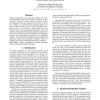Free Online Productivity Tools
i2Speak
i2Symbol
i2OCR
iTex2Img
iWeb2Print
iWeb2Shot
i2Type
iPdf2Split
iPdf2Merge
i2Bopomofo
i2Arabic
i2Style
i2Image
i2PDF
iLatex2Rtf
Sci2ools
INTERSPEECH
2010
2010
Invariant integration features combined with speaker-adaptation methods
Speaker-normalization and -adaptation methods are essential components of state-of-the-art speech recognition systems nowadays. Recently, so-called invariant integration features were presented which are motivated by the theory of invariants. While it was shown that the integration features outperform MFCCs when used with a basic monophone recognition system, it was left open, if their benefits still can be observed when a more sophisticated recognition system with speaker-normalization and/or speaker-adaptation components is used. This work investigates the combination of the integration features with standard speaker-normalization and -adaptation methods. We show that the integration features benefit from adaptation methods and significantly outperform MFCCs in matching, as well as in mismatching training-test conditions.
-adaptation Methods | Basic Monophone Recognition | INTERSPEECH 2010 | Signal Processing | State-of-the-art Speech Recognition |
Related Content
| Added | 18 May 2011 |
| Updated | 18 May 2011 |
| Type | Journal |
| Year | 2010 |
| Where | INTERSPEECH |
| Authors | Florian Müller, Alfred Mertins |
Comments (0)

